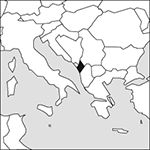
Source: MAPS IN MINUTES™ © RH Publications (1997)
Capital:
Podgorica
Area:
13,812 sq km (5387 sq miles)
Population:
653,474 (2013 est)
Currency:
1 euro=100 cents
Religions:
Eastern Orthodox 72.1%; Muslim 19.1%; Roman Catholic 3.4%
Ethnic Groups:
Montenegrin 45.0%; Serbian 28.7%; Bosniak 8.7%; Albanian 4.9%
Languages:
Montenegrin (official); Serbian; Bosnian; Albanian; minority languages
International Organizations:
UN; OSCE; Council of Europe; Euro-Atlantic Partnership Council; WTO; NATO
A small republic in the Balkans, bordered by Serbia, Croatia, Bosnia and Herzegovina, and Albania.
Physical
Montenegro has a short Adriatic coastline. It is largely mountainous, with extensive forests in the north.
Economy
Agriculture produces tobacco, fruit, and vegetables, and stock raising is important. Mineral deposits include iron, bauxite, and offshore oil, the first two underpinning important steel and aluminium industries. Tourism is also significant.
History
Montenegro was absorbed into the Serbian empire in the 12th century but remained unsubdued when Serbia was conquered by the Turks in 1389. It was recognized as an independent nation in 1878. In 1918 it became part of the federation of Yugoslavia, which came under communist control after World War II. When Yugoslavia disintegrated in 1989–1991, Montenegrins decided to maintain the federation with Serbia in a referendum (1992). Serbia and Montenegro declared themselves to be an independent country, the Federal Republic of Yugoslavia; this was replaced by the union of Serbia and Montenegro, a much looser federation, in 2002. However, Montenegro’s relations with Serbia remained uneasy and a referendum held in May 2006 resulted in a vote for independence. The union with Serbia was formally dissolved the following month. A priority since independence has been to gain EU membership. In 2015, Montenegro was invited to join NATO in its first expansion since 2009. Accession was agreed in 2017, an act Russia said would result in "retaliatory actions". After elections in 2016, Milo Dukanović, leader of the Socialists, stood down, having been Prime Minister (1991–98, 2003–06, 2008–10, 2012–16) or President (1998–2003) of the country for most of the past 25 years; he was replaced as Prime Minister by his deputy, Duško Marković.
- microwave integrated circuit
- microwave landing system
- microwave limb sounder
- microwave optics
- microwave radiometer
- microwaves
- microwave sounding unit
- microwave spectroscopy
- microwave tube
- micro‐
- micturition
- Mid-Atlantic Ridge
- midbrain
- mid-continent crustal type
- Midcourse Space Experiment
- Middle Ages
- middle ear
- middle-income trap
- middle knowledge
- middle lamella
- Middle Platonism
- middle term
- middleware
- Midgley, Thomas (1889–1944)
- midgut